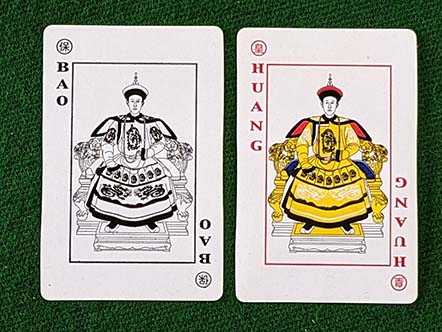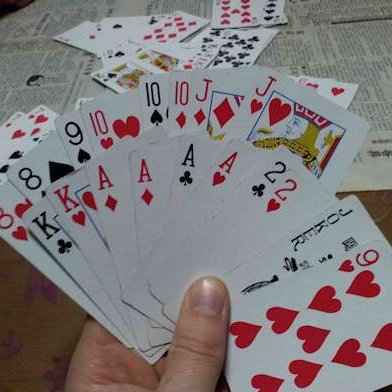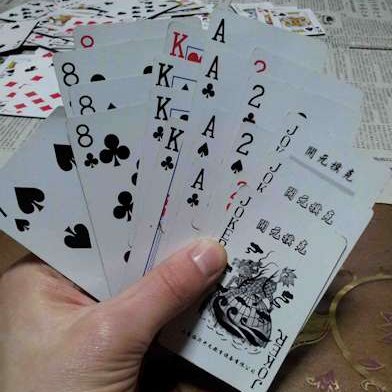Bao Huang
保皇

Chinese climbing game for 5 players: the emperor and eunuch play as partners against a team of 3 common people. The eunuch is the holder of a particular card whose location may be unknown to the other players until the eunuch plays it.
Class: Climbing games
Region: China
- Introduction
- Players and cards
- Deal and Partnerships
- Playable Combinations
- Play
- Scoring
- Sixes played last
- Variations
- Other Bao Huang websites
Introduction
This Chinese climbing game for five players is said to have originated in Shandong province, and in the early 21st century it has become popular across a wide area of northern China and online. Băo huáng (保皇) means 'protect the emperor', and the game is also often known as dìwáng (帝王) meaning 'emperor'. In each deal two players, the emperor and his protector the eunuch (xiao baozi: 小孢子), play against a team of three, the farmers or people (ping min: 平民). The emperor and the eunuch are the holders of particular cards. While the emperor is known from the start, his protector remains hidden until the card is played.
As in all climbing games the object is to get rid of one's cards (and help one's partners to do so) by playing them singly or in combinations, where each play must beat the previous play.
There are many variants of this game. The version described in the main account is fairly widespread, and is played for example in Rizhao (日照) in Shandong province. Alternative rules that I know about are summarised in the variations section. I would be grateful to hear from anyone who knows more about these or other versions of this game.
This page is based on information from Shi Ji, James Cumming and Leo Hong.
Players and cards
There are five players and a pack of 168 cards is used. This can be constructed from four standard 52-card packs from which the 3's, 4's and 5's are removed plus four red jokers and four black jokers. Suits are irrelevant in this game, and the cards rank from high to low:
Red joker, Black joker, 2, A, K, Q, J, 10, 9, 8, 7, 6.
One red joker ("huang") and one black joker ("bao") are marked on the front, and the holders of these two cards will be the emperor and the eunuch respectively. Although standard Anglo-American cards can be used, the game is sufficiently popular that special 168-card packs can be obtained for this game with the emperor and eunuch cards ready printed.
The deal and play are normally anticlockwise.
Deal and Partnerships
The cards are shuffled and stacked face down. As in most Chinese games they are not distributed by a single player. Instead, players take their own cards from the top of the pile, one card at a time, in turn, until all the cards are taken. The player to the right of the player who shuffled cuts the cards, and the next player to the right takes the first card. Since the number of cards is not exactly divisible by five, some players will have one more cards than others. Players hold their cards so that they can see their faces and their opponents cannot.
For subsequent deals, the turn to cut and to take the first card passes anticlockwise. The player who took the first card in the previous deal should cut, and the next player should take the first card.
Holding a hand of as many as 34 or 35 cards will be an unusual experience for most Western players. In China, players often hold their cards in more than one row or in a sort of array with equal cards in a column, as in the photographs.


The holder of the marked red joker (emperor card) is the emperor (or king) and the holder of the marked black joker is the emperor's protector (also known as the eunuch or the royalist), who plays as the emperor's partner. The other three players are the common people, also known as farmers or revolutionaries. The holder of the emperor card can choose not to be the emperor: in this case the emperor card is passed to the next player to the left. No card is given in exchange: the original holder of the emperor card now has one card fewer and the new emperor one card more than were originally dealt. If the new emperor does not want the role, he or she can pass the card again, and this continues clockwise around the table until it is received by someone who is willing to be the emperor. In the unusual case where none of the other players wants to be emperor, so that the emperor card is passed all round the table and back to the player who originally held it, this player must be the emperor.
The identity of the emperor is always known, even if the card is not passed on, because the emperor begins the play. However, the emperor's partner and the common people may keep quiet about what side they are on. In this case the common people will not know initially which player is protecting the emperor: they may suspect who it is by observing who seems to be helping the emperor during the play, but it will only be known for certain when the marked black joker is played. However, any of the other players may choose to declare their allegiance, for or against the emperor, before the play begins, and this doubles the score for the game. When one of the common people declares, this is known as an uprising (zàofăn - 造反). In case of an uprising other players may declare or not as they wish without further affecting the score.
If one player holds both the emperor and the eunuch cards, this player will play alone against a team of four. The emperor may say nothing about this in which case the other players will not initially realise that this is the situation. Alternatively the emperor may declare before the start of the play that he or she is playing alone, and this doubles the score. If the emperor does not wish to play alone, this can be avoided by passing the emperor card to the left.
In the second and subsequent deals there is a penalty for the losers of the previous deal. After all the cards have been taken, the members of the team that lost the previous deal must each give away their highest card other than a joker: this will usually be a two. These high cards are placed on the table face down, taken by the members of the winning team and added to their hands. The emperor from the previous deal must give away his or her highest two cards (other than jokers) if the emperor's team lost, and takes two of the high cards offered by the farmers if the emperor's team won. An emperor who was playing alone will give or receive four cards in the next deal.
If the previous deal was a draw (zero score), no tribute is given.
Playable Combinations
Cards can be played singly or several at a time. When playing more than one card, the cards must form a playable combination. The playable combinations are:
- Any quantity of equal cards, irrespective of suit, for example 8-8 or Q-Q-Q-Q or 9-9-9-9-9-9-9.
- Any number of equal cards together with any number of jokers of any colour, for example 7-7-black or 6-red or K-K-K-black-red. A combination including one joker is known as guà le yī ge (挂了一个: one card hanging), with two jokers guà le liăng ge (挂了两个: a pair of cards hanging), with three jokers 挂了三个 and so on.
- Any number of jokers of any colour, for example black-black-red.
A single card can only be beaten by a higher single card. A combination beats a previously played combination if and only if
- it is playable, and
- it has the same number of cards, and
- each card of the new combination beats a corresponding card of the previous combination.
So for example:
- 7-7-7 can be beaten by 10-10-10, which can be beaten by A-A-A, which can be beaten by 2-2-2, (two being higher than ace in this game), which can only be beaten by three jokers;
- 8-8-8-8 can be beaten by 9-9-9-black, which can be beaten by Q-Q-Q-red, but 8-8-8-black does not beat 8-8-8-8;
- any combination containing a red joker is unbeatable;
- a combination containing black jokers can only be beaten by a higher combination containing at least as many red jokers - for example 7-7-black-black can be beaten by 9-9-red-red or by K-black-red-red, but not by Q-black-black-red (since only one of the black jokers in the first combination has been beaten) and not by 7-7-red-red (since 7 does not beat 7).
Play
The emperor begins by leading any single card or playable combination. All players, in anticlockwise order, may either pass - saying 'bùyào' (不要) or 'guò' (过) - or beat it by playing a higher card or combination. As explained above, each play must consist of the same number of cards, and must be higher than the previous play. This continues for as many circuits as necessary until no one is able and willing to beat the last card or combination that was played. When a play is followed by consecutive passes from all the other players, the player who played the last (unbeaten) combination begins again and is free to play any card or playable combination.
Note that passing does not prevent a player from playing at his or her next turn if someone else has played meanwhile.
A player whose play is currently unbeaten may ask the other players not to beat it, saying 'zhàn pái' (站牌). If the teams are not yet known this may provide a clue as to which side the player is on or may be deceptive. The other players do not have to comply.
As players run out of cards they drop out of the play and the others continue until all members of one or the other team have played all their cards. If someone plays their last card(s) and these are not beaten, the turn to restart the play with any card or playable combination passes to the next player to the right who still has cards.
Scoring
When the emperor has a partner, each team's score is based on the order in which its players finished: +2 points for the player who finishes first, +1 points for second, 0 for third, -1 for fourth and -2 for last. So for example if the emperor's team come 1st and 3rd their score will be +2 (=+2+0) and the people's team will score -2 (=+1-1-2) for 2nd 4th and 5th. Each of the common people and the emperor's partner scores the amount scored by their team, and the emperor scores double. So in the above example the emperor scores +4 for the hand, the eunuch score +2 and the people score -2 each.
If the emperor's partner or any of the common people declare what side they are on before the play, the above scores are doubled.
When the emperor plays alone and comes first, the emperor scores +12 and the other players score -3 each. When the emperor plays alone and comes second everyone scores 0, and if the emperor plays alone and comes third or worse, the emperor scores -12 and the people score +3 each.
If the emperor declares that he or she is playing alone, or if any of the emperor's opponents declares an uprising, these scores are doubled (+24/-6 or -24/+6).
Sixes Played Last
Bao Huang is often played with the extra rule that sixes (the lowest cards) must be played last. In this version it is illegal to play a six until one's hand contains nothing but sixes. Sixes cannot be combined with jokers in this version.
The play in this variant is somewhat more challenging. In order to be first out of cards, it is necessary to keep a winning combination for your second to last play, so as to finish by leading all your sixes. If your second to last play is beaten, you are doomed to come last unless the player before you ends with an unbeaten set of sixes, allowing you to lead your sixes next.
Other Variations
216 cards
Bo Huang is quite often played with four complete decks plus jokers, 216 cards altogether including the 3's, 4's and 5's. In this case the 3s are the lowest cards, followed by 4s, 5s, 6s, etc.
Choosing the emperor's partner
Many players do not use a marked black joker to choose the emperor's partner. Instead, the emperor must show three identical cards and the holder of the fourth matching card is the eunuch, who protects the emperor. If you are dealt the emperor card and do not have three identical cards, you must pass the emperor card to the left. If the emperor card is passed all the way round the table back to the first player and the first player does not have three identical cards, it must be passed back to the nearest player in counterclockwise rotation who has three identical cards - that is the last qualified player who rejected it. If no one has three identical cards, the cards are thrown in and there is a new deal with the same player starting.
An emperor who holds four identical cards can play alone silently by showing three of these cards and not revealing the fourth one, or can declare and double the score by showing all four identical cards.
Passing on the emperor card
Some play that if the emperor card is passed on more than once in a deal, the second and subsequent players must pass their highest single card other than the emperor card to the next player to the left along with the emperor card. It is only the player who originally drew the emperor card who can pass it on with no accompanying card.
Solo Usurper (Qiăng dú - 抢独)
Some allow any player, before the start of play, to claim the emperor card from whoever has it and declare that they will play alone (score: 24 points, the same as when any emperor declares playing alone). Presumably the original holder of the emperor card can also do this if not requiring a partner.
Open Tribute Cards
Some play that the losing team place their highest cards (other than jokers) face up on the table, and these are taken by the winning team in order of their finishing position in the previous deal.
Ranking of jokers
Some play that the marked red joker is higher than the other red jokers.
A few people play that a red joker can be beaten by three 2's.
Order of Playable Combinations
A few people play that when a combination that includes jokers is played, it is only the jokers that have to beat the corresponding cards of the previous play. It is sufficient for the ordinary cards to be equal. With this rule, 9-9-9-9 can be beaten by 9-9-9-black, which can be beaten by 9-9-9-red. However, jokers have to be beaten, not just equalled, so a combination including a red joker is still unbeatable. Also, a set of ordinary cards can only be beaten by another set of the same rank if a joker is used.
Play without scoring
Some players do not keep score. Instead the result of each deal is as follows:
- If the first and last players to run out of cards are from opposing teams, the first player's team wins and the last player's team loses.
- If the emperor has a partner, and the first and last players are from the same team, the game is a tie (and no tribute cards are given in the next deal).
- If the emperor is alone, the emperor wins if he is first to run out of cards and loses otherwise.
Direction of play
Sometimes the entire game is played clockwise rather than anticlockwise.
Other Bao Huang websites
The online encyclopedia Baidu Baike has a page describing Bao Huang.
Bao Huang can be played at the popular Chinese online site QQ games.
A set of rules in Chinese can be found at homygame.com.